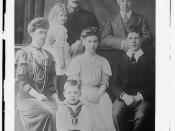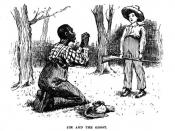To understand Mark Twain's cynicism in The Adventure of Huckleberry Finn one must understand what satire is. It can be defined as a literary work holding up human vices and follies to ridicule or scorn and to expose and discredit vice or folly. Satire is the tool that Twain employs in his novel to exaggerate and make fun of the many problems facing American society. Some of the major aspects of society that Twain attacks are religion, slavery, and human nature itself.
Religion is one of the main victims of Twain's satire. The satire is visible when the Widow Douglas tells Huck about Moses. When the widow starts "a-bothering about Moses," Huck doesn't understand why she cares about him so much since he was of "no kin to her." Later in the novel Huck realizes that prayer has never done anything good for him, and he cannot see that it has done anything for many others either.
Huck concludes that "[he'll] go to hell," because he doesn't want to pray and "[do] the wrong thing." Through Huck, Twain is able to attack the blind faith that civilized society places toward religion.
The King and the Duke are perfect people for Twain to express his satire. They are frauds that make their money by deceiving people. Twain goes on to satirize human nature through the town's reaction to the Royal Nonesuch with the King and the Duke. Instead of running the frauds out of town as soon as they realize that they were being robbed, the town's people let them stay and encouraged others to go see the show as well so that they would not be the only ones taken in by fraud. At this point Twain exaggerates the distance people will go so that they will not be the...


